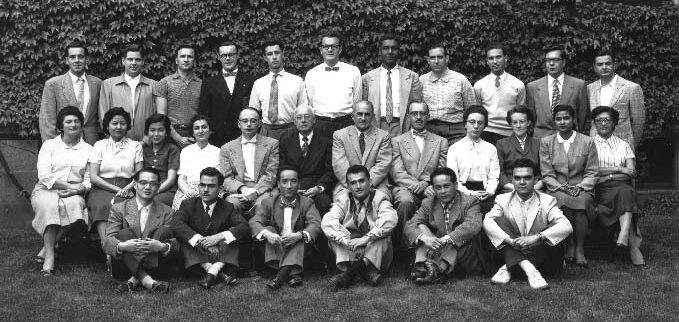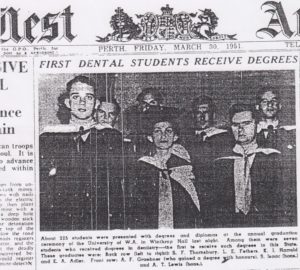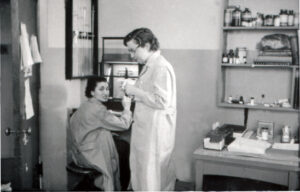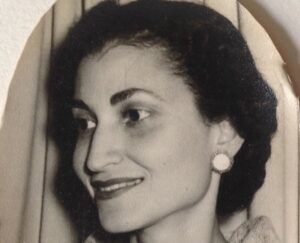A Pioneer in Dental Health and Gender Equity: Dr. Sally Joyston-Bechal

By Kristina Novakovic
Fulbrighters are known and commended for their ability to foster leadership and innovation in their areas of research. They have historically demonstrated their ability to be leaders and changemakers in Australian society, applying their skills and research in ways that we have benefitted from for decades.
A quintessential example of this is Dr. Sally Joyston-Bechal, a remarkable scholar, whose research had significant impacts on dentistry in Australia, and who inspired women for decades to come.
Sally entered the field of dentistry in 1951, graduating as the only woman in her cohort at the University of Western Australia (UWA). During this time, and for decades thereafter, dentistry was a male-dominated industry; Sally was not only the sole female graduate but was also her cohort’s highest achieving student. Her achievement went unacknowledged at the time, as senior academic staff informed her, that although she was Dux of her year, they had decided to award the honour to a fellow male graduate on the grounds that it would serve him better in his career, and that Sally would likely marry and have a family. This lack of formal recognition did not deter her from continuing her academic career, and in 1954, Sally was awarded a Fulbright Scholarship to Eastman Dental Dispensary in Rochester, New York, which led to a Master of Science in 1956.
During this time, and for decades thereafter, dentistry was a male-dominated industry; Sally was not only the sole female graduate but was also her cohort’s highest achieving student. Her achievement went unacknowledged at the time, as senior academic staff informed her, that although she was Dux of her year, they had decided to award the honour to a fellow male graduate on the grounds that it would serve him better in his career, and that Sally would likely marry and have a family. This lack of formal recognition did not deter her from continuing her academic career, and in 1954, Sally was awarded a Fulbright Scholarship to Eastman Dental Dispensary in Rochester, New York, which led to a Master of Science in 1956.
It was at the Eastman Dental Dispensary that Sally began to develop her skills as an innovator in preventative dentistry. The Fulbright Program enabled her to work with Finn Brudevold and Basil Bobby, distinguished dental researchers who pioneered fluoridation in preventative dentistry. The Eastman Dispensary in Rochester was a hot bed of research, not only in fluoride and preventative dentistry, but also fascinatingly, the materials we now use for the restoration of teeth were also developed there.
“[Working with US experts] gave me an excellent grounding in the fundamentals in research and writing scientific papers, so important to the progress of my career”.
A ripe environment for research, and with the opportunity to work with some of the brightest minds in her field, Sally’s Fulbright program afforded her a unique and invaluable experience. “Consequently, my academic career was not narrow, but open”. She took advantage of her time in the US to develop friendships and immerse herself in this new foreign culture.
“During my time in the US, I was able to socialise and make lifelong friendships, not only with US citizens, but also with scholars from other parts of the world. Travelling around the country also gave me an insight into the varying cultures in this vast country.”
This was a time where long-distance travel was very expensive, exclusive to those who could afford to travel and experience other parts of the world. Fulbright gave Sally the opportunity to do just that. New York afforded her a vibrant cultural experience, abundant with music, art and politics. Immersing herself in this new foreign culture, she experienced significant personal growth, alongside her academic successes.

Dr Sally Joyston-Bechal (left) and an assistant at the Eastman Dental Dispensary, Rochester, NY
“I took advantage of student rates for entrance to the great art galleries in New York City, as well as for the performances by the excellent Rochester Symphony Orchestra”.
Sally went home to Perth with an enhanced knowledge of music and art, as well a pile of classical and jazz records, “some costing as little as $1!”. She had also gained a new interest in politics, stimulated by joining her American friends at the hustings during electioneering for the 1955-1956 presidential elections. Upon her return to Perth in 1956, Sally’s research led to significant developments in the fluoridisation of water in Australia, which we still benefit from today.
“I gave many talks and lectures to allied Professionals and, together with Drs. Tom Woodall and Eric Watson, presented a significant paper, influencing the ultimate fluoridisation of Perth’s water supply.”
Dr. Meredith Arcus, a Perth-based dental and medical practitioner who graduated from UWA 30 years after Sally, notes the significant, and tangible influence Sally’s research had: “I can still remember my mother lining up her 5 children each morning to take a fluoride tablet in Perth before the water was fluoridated.”
Sally brought with her to Perth knowledge and skills she had learned in the US and used them to transform and benefit Australian society; this speaks to the true core purpose of Fulbright and what makes Sally such an exemplary alumna. 
Sally’s Fulbright experience kickstarted a brilliant academic career that involved working at the London Hospital Medical College Dental School (University of London) where she gained a PhD, working as a Senior Lecturer and Consultant for the NHS, and publishing over thirty publications, including a textbook, Essentials of Dental Caries, jointly with Edwina Kidd.
But Sally’s impact extends beyond her academic influence. She is seen as a leader and role model for women in dentistry, inspiring generations of women to take up dentistry and bridge the gender divide in the industry.
Dr. Meredith Arcus, tells us that as dental students, they had learned about male dentists who had excelled in their careers, but information on Sally was missing, and it wasn’t until 1992 that she and her peers learned of her illustrious career.
“To discover that the first female graduate from the UWA Bachelor of Dental Science was a woman who achieved first class honours, topped the class, and achieved a Fulbright Scholarship, masters in dentistry, and a PhD was extremely exciting.”
While Sally had her successes, the gender divide was equally apparent in the 1970’s when Meredith was studying, where the opportunities for women to complete a Masters in dental specialties did not exist, and dental study groups excluded women.
“Dr. Sally Joyston-Bechal was a founding member of [a dental study group] in the 1950’s, when she left WA, yet they did not ask a woman to join until the 1990’s!”
This inspired Meredith to establish the Sally Joyston-Bechal Women’s dental study group, instigating a change in the dental workforce, where women started joining study groups and studying dental specialties. The group also gave women in dentistry a place to socialise and discuss issues that impacted them.
Dr. Sally Joyston-Bechal is now 95 and her legacy in dentistry is enduring: a Women’s Dental study group bearing her name, a Sally Joyston-Bechal Study Group Prize awarded by the University of Western Australia where she first began her illustrious career, and in the numerous publications and research impacts that her work has had over the years.
Sally has embodied the core values of a true Fulbrighter, in her innovation, her leadership, and approaching her cultural experience with an openness and willingness to learn. To current and future Fulbrighters, she has some advice:
“Go to [your] destination with an open mind, to profit not only academically but socially, and try to see beyond the campus of their university because the US is a vast and diverse country.”
Copyright © 2021 – Fulbright


 Facebook
Facebook Twitter
Twitter Linkedin
Linkedin Instagram
Instagram